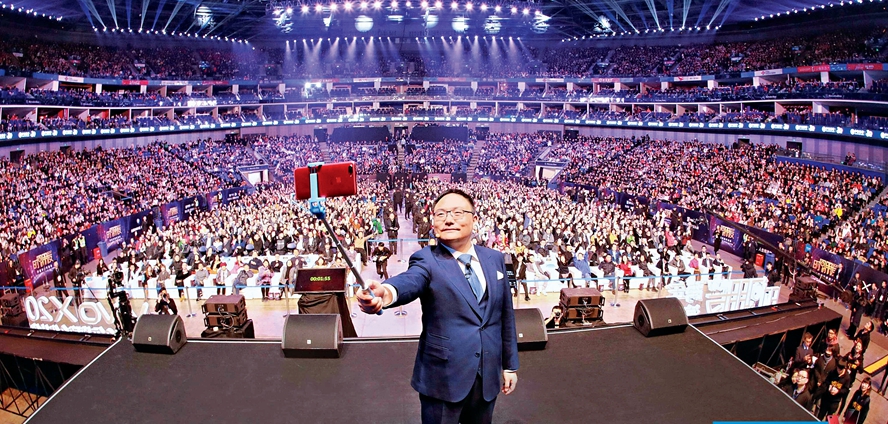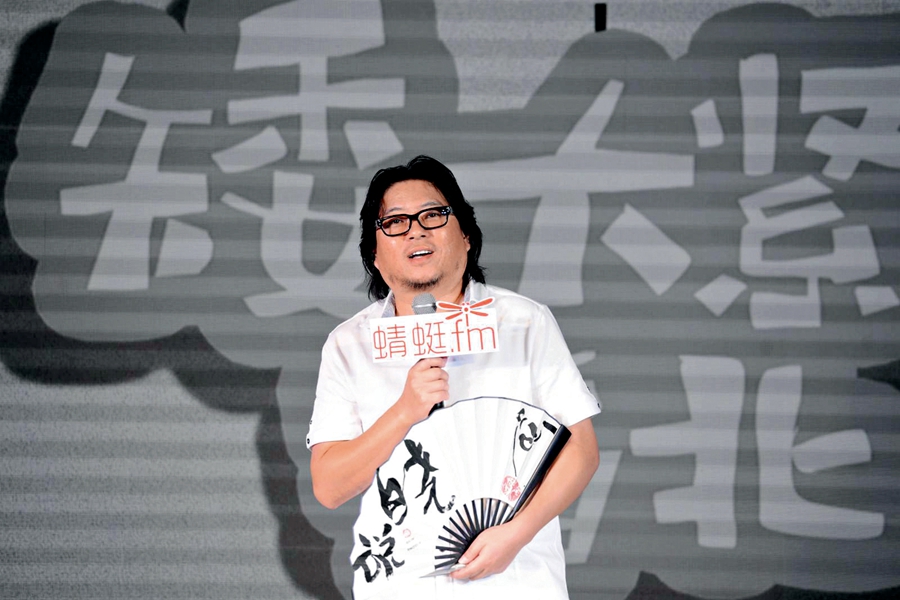By staff reporter VERENA MENZEL
By staff reporter VERENA MENZEL
THE raspy voice of the tribal elder interweaves with the crackle of the campfire and the rustling of the leaves in the evening air as he narrates tales of wild beasts and courageous warriors. Elsewhere, the sound of pages being turned as a mother reads fairytales, while the children, faces buried up to their noses under blankets, listen with rapt attention, eyes wide open, spellbound by night time stories that carry on in dreams. These or similarly idealized yet archaic scenarios come to mind whenever storytelling is brought up.
But in 2018, the age of ubiquity of screens of every shape and size from smart phones, HDTVs, gaming PCs and consoles, 3D IMAX movies, VR glasses and augmented reality – has the allure of oral storytelling still held up? Or will it soon join the rank of extinct traditions of bygone eras such as flip books or puppet shows?
Man as a Narrative Animal
The ability to tell stories, as many scientists agree, probably brought our species decisive evolutionary advantages. It enabled humans to pass on valuable experience in oral tradition from one generation to the next, long before the invention of writing, paper, or other media for storing information.
Fictional stories, told according to well-established, familiar patterns, enabled our ancestors to go through physical and emotional encounters, to make and share experiences, and to learn from them without putting themselves in actual danger.

Luo Zhenyu, a former TV producer, gained popularity through an audio sharing app.
In this sense, as it is assumed today, orally told stories functioned as a kind of virtual training. They were able to take us to other worlds, to confront us with unknown situations and problems. Through them, we accompanied their protagonists in coping with their adventures and difficulties and drew our lessons as individuals or groups out of it.
Even today, stories certainly still fulfill this function. What has noticeably changed though, are the modes and media of transmission. Instead of our mental cinema, nowadays the Internet and rich multimedia experiences elicit endorphin rushes and goose bumps.
But is oral narration, the most original form of storytelling, in this digital age, only a relic of evolution that will soon disappear completely from the scene? One day perhaps – but certainly not yet, this is currently impressively shown in China!
“Himalaya” Paves the Way
“One can only see well with one’s heart. The essence is invisible to the eyes...” A gentle male voice accompanied with discreet twangs of guitar strings reaches my ears and my consciousness via the earplugs of my smart phone.
It is the mobile app of the Chinese audio sharing portal Ximalaya FM (in English Himalaya) that sends these famous lines from the novel The Little Prince into my earbuds.
While I sit on the sofa of my Beijing apartment and listen to the Chinese audio book, already more than two million pairs of ears before me had done so, as the digital display reveals.
As early as 2014, a user of the app recorded the Chinese translation of the classic by Antoine de Saint-Exupéry and put it online in 27 short episodes. Two million people listening to an audio book – that doesn’t sound like the end of oral narrative to me.
The creators behind China’s first audio streaming service Ximalaya launched the first version of their app of the same name in March 2013. Since then, users can upload their own audio contributions to the platform and share them with other visitors.

Today, Ximalaya has around 40 million active users per month, six million of whom actively use the service every day. On average, each of them spends around 125 minutes on the platform. According to the provider, around 10,000 new audio contributions are uploaded daily. Within about five years, the supply has ballooned to over 60 million audio files.
This makes Ximalaya the most successful podcast platform in China, albeit by no means the only one. Competitors such as Qingting FM (Dragonfly FM), LRTS (Audio books for lazybones), Lizhi FM (Lychee FM) or QQ FM (named after the popular messenger service) now also count millions of users.
Why is it about oral narration that China is experiencing such a revival in the 21st century?
“Especially for mobile users, audio streaming is simply a convenient source of information and entertainment, particularly when their eyes are busy elsewhere,” explained Ximalaya co-founder Chen Xiaoyu in 2015 at the Shanghai TechCrunch, an event of the eponymous world’s leading online news portal for technology and Internet companies. The 2015 Shanghai TechCrunch focused on the topic of the Internet of Things (IoT).
According to Chen, audio streaming is not just a novel entertainment option for everyday situations such as during commuting or housework, where our eyes need to focus on other things, but also whenever our eyes get tired of the glare of screens or we want to fade away for a while from the visual overload of everyday life, we like to immerse ourselves in the perceptually better manageable world of the narrated word, Chen said.
The founders of Ximalaya recognized this growing need of modern city dwellers at an early stage and were not only able to continuously expand their user base thanks to a wide range of radio plays, but also to establish numerous cooperations in the areas of in-car and home entertainment.
Today, Ximalaya works together with well-known car manufacturers such as Ford, BMW, and Cadillac in the development of car entertainment systems for the Chinese market. And there are also cooperation agreements with manufacturers of intelligent household appliances, including such renowned companies as Haier, Midea, Skyworth, and Hisense.
IoT Opens up a Future Market
Experts predict a rosy future for the IoT in particular, from which the market for audio streaming should also benefit considerably. More and more of our everyday devices could soon be connected directly to the Internet.
These are forecasts that make the providers of audio sharing services extremely optimistic.
“We have even received cooperation requests from manufacturers of light bulbs and refrigerators who want to keep the option open to integrate our content into their future products,” co-founder Chen said in Shanghai in 2015.
Yu Jianjun, CEO and co-founder of Ximalaya, expected the market volume for audio books and audio streaming in China to swell to RMB 300 billion (US $47.7 billion), as he told China Daily in mid-2017. The tech entrepreneur estimated that entire industry chains, including authors, publishers, professional speakers, and app developers, could benefit from the boom.
According to surveys by Beijing-based Internet consulting firm Analysys, the market for audio books has already experienced impressive growth in recent years.
In 2016, the market volume of the industry amounted to an impressive RMB 2.2 billion. According to forecasts, this figure is expected to rise to around RMB 4.2 billion by the end of 2018.

Music producer Gao Xiaosong launched his own talk shows on Qingting FM last year.
But it is not audio books alone that provide audio sharing services in China with such a large user influx. In addition to domestic and foreign audio book titles, the portals also feature numerous listening formats of other styles, including a wide variety of music programs, news formats, talk shows, and audio features as well as podcast courses for every taste.
While the podcasts were initially recorded by amateur speakers and reading enthusiasts in their private living rooms, the formats have now become noticeably more professional.
As it gains momentum, an increasing number of celebrities from the entertainment industry as well as Internet celebrities have also jumped on the bandwagon.
Instead of simply reading existing works, China’s podcast sharing platforms today offer a wealth of originally created content and formats with regular updates, which are directly delivered to the mobile phones of the fan community via subscribed program channels.
A Successful Business Model
In addition to audio books, the most popular sections include business information, comedy & entertainment, love & self-help content, history and culture programs as well as formats for children.
The most listened-to podcast series on Ximalaya currently include some successful music and talk show programs produced by the streaming service itself such as “Good Voice” and “Good Night City,” but above all the channels of celebrities.
One of these popular formats is the Logic Show by Chinese media expert and IT entrepreneur Luo Zhenyu, in which he chats about business, society, and history.
The comedy talk show Guo Degang’s Xiangsheng, in which the famous performance artist Guo Degang introduces traditional Chinese crosstalk (so-called Xiangsheng) with changing guests, ranks similarly high on the popularity scale.
The well-known Chinese musician, music producer, and director Gao Xiaosong provides his audience with entertaining historical, cultural, and social anecdotes from all over the world in his talk show Morning Call.
In just a few years, Ximalaya has grown from a grassroots enthusiasts podcasting platform, on which initially mostly amateur speakers uploaded their content, to one of China’s most successful Internet companies, which has long since attracted investments of millions of yuan.
Copyright Strategy
Ximalaya is also China’s undisputed number one in the industry today in terms of copyright. In July 2017, the company stated that it held around 70 percent of the audio rights to the most popular titles in Chinese bookstores.
The portal has also signed strategic cooperation agreements with major publishing companies such as CITIC Press and China South Publishing & Media Group to publish audio versions of their bestsellers.
Apart from that, Ximalaya also cooperates with China Reading Limited, China’s largest platform for online literature. Thus, the company laid the legal foundation for future business success.
In view of the rapid rise of podcast providers, the times when young IT companies like Ximalaya competed for sponsors and cooperation partners are a thing of the past. Advertisers have long recognized the potential of China’s audio streaming services and are approaching the providers on their own.
More than 10,000 brands are now cooperating with Ximalaya. In addition to traditional advertising, many companies today also enter into direct co-operations with the hosts of successful channels, or even open their own channels via which they skillfully present their products.
As I interrupt my listening session of the Little Prince, an advertisement from Volkswagen promptly pops up on my mobile phone display. Some advertisers even go so far as to let audio hosts use genuine content to push their products.
For example, the Chinese umbrella manufacturer Jiaoxia had an episode about sun protection created by the successful audio blogger Caicai and distributed it via her channel on Ximalaya, with resounding success: Thanks to the skillful audio promotion, 20,000 umbrellas were sold within only 24 hours.
Knowledge for Sale
Another strategic development direction on which the creators of Ximalaya are betting for the future is paid content.
Already today, some channels and programs have to be subscribed to for a small fee. Over the past two years, the portal has already proven that this could work out through its “123 Knowledge Day.”
Inspired by similar sales events like the popular “Black Friday” in the U.S. or Alibaba’s annual “shopping carnival” on November 11, Ximalaya staged its “123 Knowledge Day” for the first time on December 3, 2016.
The event for paid audio content brought Ximalaya a sales increase of RMB 50 million (6.4 million euros) for the premiere within only 24 hours. Thus, Ximalaya matched Alibaba’s income from the first “Shopping Carnival” in 2009.
In 2017, the “123 Knowledge Day” then achieved a turnover of RMB 196 million, almost four times that of the previous year. Half of the income went to Ximalaya, the other half was distributed to podcast creators.
All these figures underline the great economic development potential of the industry. And Ximalaya co-founder Yu Jianjun has great ambitions for the future:
“Our goal is to build a platform modeled on Alibaba’s Tmall, where providers create high-quality content for our users,” Yu said in 2017. Yu aims to become a Taobao of the media world, as it appears.
And the Chinese public seems to be readily willing to open their purses to purchase knowledge for sale. Above all, audio programs around topics like career and employment, finances, and life coaching have several million followers. Among the most popular podcast search tags in 2017 were terms such as “better life,” “prosperity” or “personal success.”
Looking more closely, the journey of the evolutionary origins of storytelling comes full circle, as even in the 21st century we seem to have the need to learn through spoken word and virtual experiences of others, in order to prepare ourselves for future difficulties and potential risks and thus gain an evolutionary advantage.
Only that today it is no longer wild animals and predators that lurk as real dangers in the undergrowth of the jungle, but have been supplanted by the fear of falling behind financially and in career growth in the concrete jungles.
In the age of infotainment, the heroes of modern times are those who have gained useful experiences and success in their domains and who share the wisdom gleaned from them with others. They inspire the audience’s imagination in their quest for self-optimization and a happier life and, at the same time, help fuel the growth of the online and offline economy.
All this ensures that the spoken word will remain very much alive in China and elsewhere in the world in 2018, and not at odds, but instead flourish even more in the digital information age.